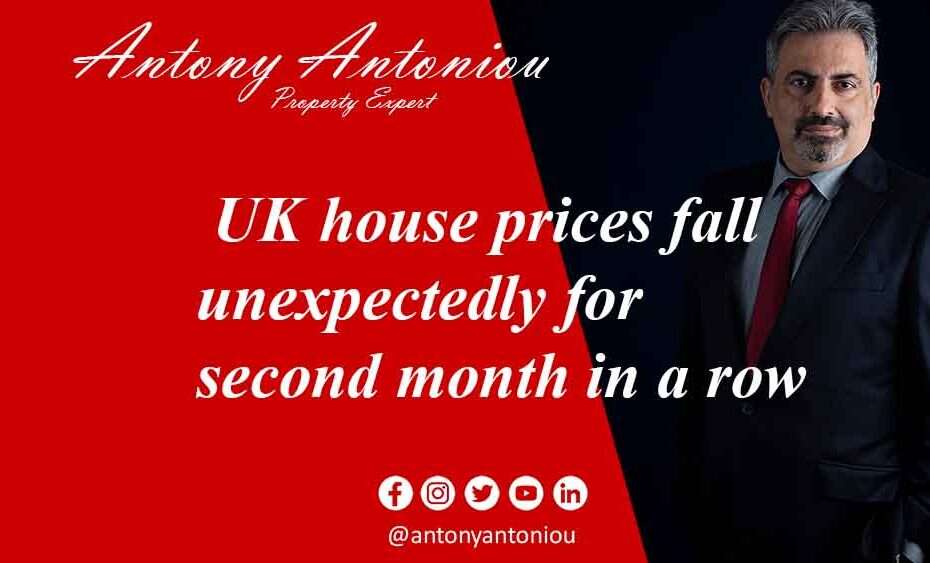UK house prices fall unexpectedly for second month in a row
Tumbling House Prices Raise Affordability Concerns
A Downward Spiral
UK house prices have unexpectedly declined for the second consecutive month in April, according to the building society Nationwide. This slowdown has been attributed to ‘affordability pressures’ stemming from high mortgage rates, casting a shadow over the traditional spring homebuying season.
With some economists suggesting that two month-on-month falls in the closely watched index “start to look like a trend,” and new fixed mortgage rates continuing to rise, the data will undoubtedly exert further pressure on the Bank of England ahead of next week’s interest rate announcement.
Figures Don’t Lie
The average house price in April stood at £261,962 – a 0.4% decrease from March, when the lender’s monthly index recorded a 0.2% month-on-month drop. Remarkably, a typical UK home is now worth £11,700 less than its value in August 2022, just weeks before Liz Truss’s ill-fated mini-budget triggered financial turmoil.
Nationwide also revealed that the rate of annual house price growth fell to 0.6% in April from 1.6% the previous month. Robert Gardner, the lender’s chief economist, stated: “The slowdown likely reflects ongoing affordability pressures, with longer-term interest rates rising in recent months, reversing the steep fall seen around the turn of the year.”
Echoing the sentiment, he added: “House prices are now about 4% below the all-time highs recorded in the summer of 2022, after taking account of seasonal effects.”
Mortgage Mayhem
Last week, major lenders including Barclays, HSBC, and NatWest increased the rates on their fixed mortgage deals in response to some economists pushing back their forecasts for when the Bank of England will start to cut interest rates. This trend continued, with more lenders raising the cost of their new deals this week. On Tuesday, Nationwide lifted some of its fixed rates by up to 0.25 percentage points. Meanwhile, Moneyfacts, the financial data provider, reported that the average new two-year fixed mortgage rate was continuing to creep up and now stood at 5.91%.
The Waiting Game
The Bank is expected to announce an interest rate cut later this year, and while some economists believe this could come as soon as June, many others believe August or September is more likely.
Commenting on Wednesday’s figures, Tom Bill, the head of UK residential research at the estate agent Knight Frank, said the house price growth seen in the first two months of this year “is going into reverse” as higher mortgage rates take their toll on demand. However, he added: “We believe demand and house price growth will pick up later this year as a rate cut moves on to the horizon.”
Moderation on the Horizon
The Nationwide analysis pointed to some moderation in the recent recovery in housing market activity, in which mortgage approvals rose in March to their highest level since September 2022.
In a survey of first-time buyers commissioned by the building society, 49% of those hoping to take their first step on the property ladder in the next five years said they had delayed plans over the past 12 months.
Breaking Down the Barriers
Of those holding back on buying their first home, 53% cited high house prices as the primary reason, while 41% cited higher mortgage costs as the preventive factor. Interestingly, 55% of those surveyed said they would be willing to buy in a different part of the country where house prices were cheaper or they could get a bigger home.
Seeking Stability and Support
Tomer Aboody, a director of the property lender MT Finance, expressed concerns about the situation, stating: “With a drop in house prices said to be created by a lack of affordability among buyers and uncertainties around interest rates and inflation, some stability or help is needed.”
He further elaborated, “Whether this comes from reduced interested rates, more flexibility on mortgages, or potentially some stamp duty reform, buyers need to feel confident that they can commit to a purchase and move.”
The Path Forward
As the housing market navigates these challenging times, it remains to be seen whether the government and relevant authorities will intervene to alleviate the affordability crisis and restore confidence among prospective homebuyers. The coming months will undoubtedly shed light on the trajectory of house prices and the broader economic landscape, leaving stakeholders eagerly awaiting signs of stability and growth.

